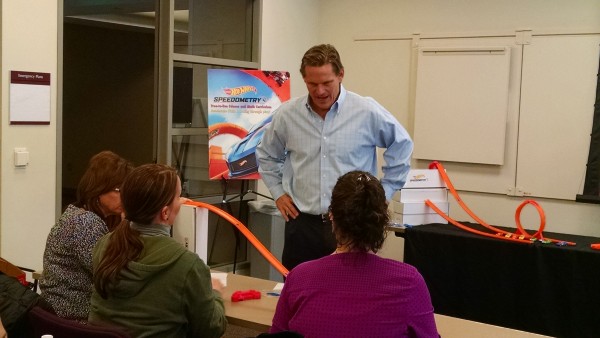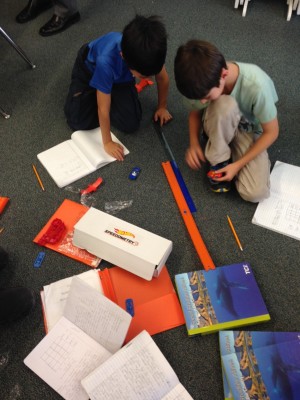Hot Wheels Speedometry: a curriculum used in Denver classrooms scores big in fourth-grade testing

Mattel Hot Wheels Speedometry program is helping improve fourth-grade STEM testing.
In 2014 Mattel and the USC Rossier School of Education introduced Speedometry, an innovative program that uses cars, tracks and household items to make STEM (Science, Technology, Engineering and Math) learning fun and engaging.
Since Speedometry’s launch, there have been many exciting developments paving the way for the program’s success. Speedometry has been introduced to hundreds of thousands of teachers, key education officials, parents and administrators in Denver, as well as Austin, Chicago, Detroit and Phoenix.

Speedometry by Mattel Hot Wheels.
Peder Hansen, Media and STEM Specialist for Frisco Elementary School in Colorado, was one of the teachers who received a classroom kit: “Our school district is committed to providing students with learning opportunities that give them hands-on experience with technology tools, fluency in the language of mathematics, and comprehensive skills in science and engineering. These opportunities help learners build deeper understandings of each concept within a content area and a clearer vision of how these skills will help them succeed in the STEM careers of the future.”
The Speedometry curriculum, created by USC Rossier, is now available in both English and Spanish, and a number of schools have adopted Speedometry into their science programs. To date Mattel has distributed more than 23,000 free Speedometry kits (includes 40 cars, loops and over 100 feet of track) to teachers who have requested them, through the Speedometry website.
Even more exciting- the results of a district-wide test of the curriculum show that Speedometry improved student learning relative to a control group. Key findings of the two-week study, which involved approximately 1,800 fourth graders in 59 classrooms, include:
- Speedometry leads to improvements in student knowledge, interest and positive emotions. Also, girls’ negative emotions about science and mathematics were found to decrease as a result of Speedometry.
- Students who experienced Speedometry out-performed who had not experienced Speedometry on a test of science and math content knowledge.
- Students who experienced Speedometry showed greater engagement, interest, and positive emotions about the lessons than students who experienced traditional math and science lessons.
- There was no significant difference in the findings based on gender, English learner status, or special education eligibility.
- Implementing Speedometry was associated with increases in teachers’ confidence to teach inquiry science skills.
Robert Goodwin, Executive Director of the Mattel Children’s Foundation, said, “We wanted to make a sustained positive impact for children and their teachers, so it was important that the positive feedback we received from classrooms early on was backed by extensive research. These results confirm that play can enhance learning and increase child engagement.”
“With America’s need for more college graduates entering the STEM fields, teachers need to find ways to make scientific topics engaging and accessible for students from an early age,” USC Rossier Dean Karen Symms Gallagher said. “This program created a curriculum that brings science and math to life for kids and is grounded by the research and assessment of leading Rossier experts in education.”
Stay tuned for more exciting Speedometry updates in the coming months. In the meantime, please spread the word and make sure the 4th graders in your life are using Speedometry! To learn more, visit hotwheels.com/Speedometry.
Latest posts by RMP Staff (see all)
- Colorado attorney general, local, state officials weigh in on Utah oil train case set for SCOTUS hearing - October 26, 2024
- Analyzing the potential impacts of Kroger-Albertsons merger on Colorado’s Western Slope - November 21, 2023
- Appeal filed in lawsuit seeking to keep Trump off Colorado ballot for engaging in an insurrection - November 21, 2023

You must be logged in to post a comment Login